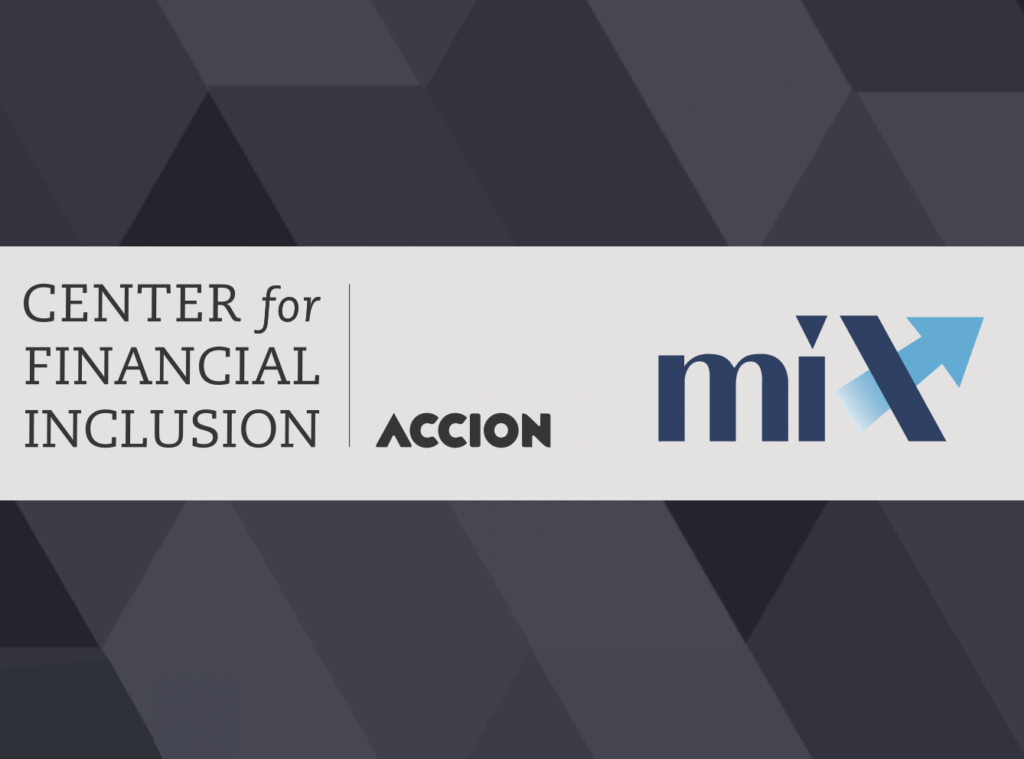
Topic
This post was originally published on NextBillion.
The financial inclusion community has been built over many years through strategic investment and coalition building among like-minded donors, practitioners, investors, regulators, researchers and sector support organizations. It is a unique coalition that has been able to effectively move the needle on access to financial services for the world’s poor for more than three decades. Yesterday came news that two key players in the inclusive finance space are joining forces: MIX, for nearly 20 years the chief data resource for inclusive finance, and CFI, a leading independent think tank. The two organizations issued a joint press release announcing that, effective next week, MIX will officially become a unit of CFI. MIX’s formidable data skills will complement CFI’s work to empower low-income customers during a time of rapid and profound change in the sector.
The forces of global economic integration and technology have been reshaping industries, giving rise to new actors and business models – and the financial services sector is no exception. Findex, the World Bank’s triennial financial inclusion survey, found that the share of financially included adults rose by 18 percent between 2011 and 2017, progress that is impossible to imagine without digital technology. While much of that rise was driven by mobile network operators and a few tech-savvy banks, the market has unleashed a torrent of innovation that has pulled in companies that are new to financial services, including massive platforms like Google and Tencent. Hundreds, if not thousands, of smaller fintechs are also finding opportunity in this watershed moment to quickly go to market with financial service offerings that are more accessible, innovative and, ideally, appropriate for those who are financially excluded or poorly served.
Yet the more that financial services, especially for low-income segments, become the province of tech-powered platforms and other players who are not required to report to any central authority, the more market data becomes fragmented and siloed. This makes it more difficult to have a complete view of how low-income customers are being reached and whether they are being served responsibly. It’s potentially an unhealthy state of affairs. Trustworthy, accessible information is a fundamental requirement for the proper functioning of any market, so this rapidly accelerating data fragmentation should be cause for concern.
Trustworthy, accessible information is a fundamental requirement for the proper functioning of any market, so rapidly accelerating data fragmentation should be cause for concern.
When MIX was founded in 2002, information asymmetry was one of the defining constraints on inclusive finance. Many of the operators were unregulated credit-only providers, and there were no universal standards – much less a repository for reporting them. With the backing of a cross-section of industry stakeholders, MIX did the hard, unglamorous work of designing data standards to define and measure simple and vital data points such as “active customer” and “self-sufficiency,” which enabled meaningful comparisons between financial services providers. MIX created benchmarks to identify investment opportunities, and built relationships of trust around the world to encourage financial services providers to report their data, and capital markets to make use of it. All of this is easy to take for granted now. But MIX’s work to build a massive storehouse of robust supply-side data helped correct a market failure, which in turn helped unlock billions of dollars in investment flows. MIX is now at the forefront of filling the void of data on fintechs, defining and measuring some of the same data points it worked with in its early days – while also gathering and analyzing additional data demanded by today’s donors and investors, covering areas such as “annual revenue per user” and “inclusivity.”
Just as MIX made important contributions to building the supply-side understanding of inclusive finance, CFI has been one of the leaders on the demand side. Formed in 2009 by Accion as a public good to the sector at a critical moment when widespread over-indebtedness was driving microfinance clients to despair and even suicide, CFI emerged as a powerful voice for consumer protection. It launched the Smart Campaign, a global effort to embed client-centricity into the culture and operations of inclusive finance, and its applied research into the financial behaviors and needs of low-income people has made a major contribution.
The two organizations’ skills, in other words, complement each other perfectly. Data is the raw material that fuels insights and thus advocacy. Those functions are stronger together, and that strength is needed more than ever at this moment, when the same technology revolution that is expanding access so dramatically is also making market data more opaque – and raising important new consumer protection concerns, especially around privacy. The CFI-MIX integration is a powerful means to preserve the gains that both organizations have already made for inclusive finance, and to position them to tackle new challenges together.
The two organizations’ skills complement each other perfectly.
This merger of opportunity happens at a time when the development community has unified around the Sustainable Development Goals (SDGs), an inspiring and ambitious agenda with a price tag to match: almost $4 trillion per year by some estimates. It is a sum that requires crowding in capital on a massive scale. This has resulted in more development assistance being channeled directly into SDG-related investments and less into entities like MIX and CFI, which offer public goods — information, benchmarks, principles, guidelines — that catalyze investment, build inclusive sectors and protect citizens. Public goods are particularly important during periods of disruption; they are used by entrepreneurs, policymakers, regulators, journalists and development organizations to find opportunities and make sound decisions. On top of this is another important factor, which is of course the COVID-19 pandemic and the economic earthquake it is creating around the world. As organizations scramble to understand what is happening on the ground, the need for real-time data and principles for the protection of vulnerable customers is more urgent than ever.
In a sector going through such profound structural change, it is also critical for inclusive finance to move away from specialization and silos to build agile, more robust businesses and organizations that contain a wider range of skills, which can operate more efficiently and take greater risks in pursuit of a broader agenda. But that’s easier said than done. Business school case studies abound with examples of mergers and acquisitions that made perfect sense in the spreadsheet but proved a lot harder when organizational cultures and leaders’ resolve were put to the test. We have confidence that this marriage will be a success story, as it is being led by some of the most respected and experienced veterans in the inclusive finance sector, who share a vision and a strong commitment to the future of public goods in the inclusive finance space.
We hope that MIX and CFI’s choice to integrate can serve as an example of successful, mission-driven consolidation for the financial inclusion community. We will need to continue to work together if we hope to match the achievements of the last 10 years of inclusive finance and to overcome the challenges — and embrace the opportunities — that lie ahead.
Note: Tillman Bruett is a member of the MIX board.
Tillman Bruett & Greta BullWe hope that MIX and CFI’s choice to integrate can serve as an example of successful, mission-driven consolidation for the financial inclusion community.









